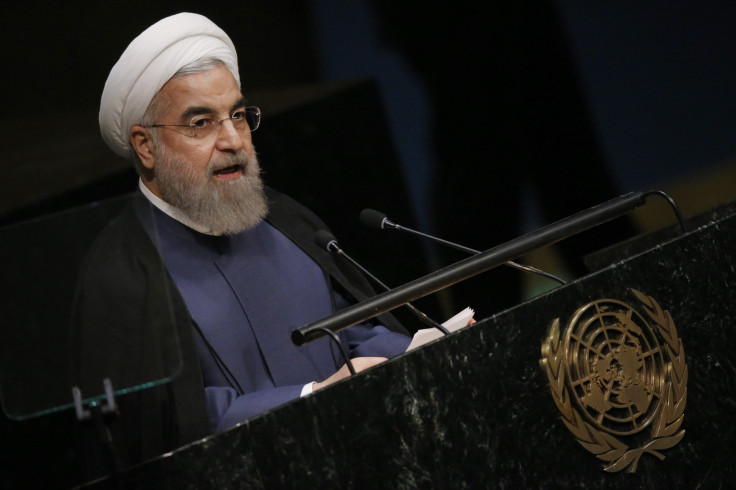Iran President Rouhani Hails Nuclear Deal While Disagreeing With US Over Syrian Civil War, Regional Issues

The Iran nuclear deal recently reached by the U.S., Iran and five other world powers, paves the way for cooperation in the region, Iranian President Hassan Rouhani said Monday at the United Nations. The agreement provided a model for how countries could avoid war while also working for mutual gain. At the same time during his address to the U.N. General Assembly, Rouhani touched on critical areas in which Iranian and U.S. policy disagree in the region, namely over the protracted war in Syria.
"From the standpoint of international law, this instrument sets a strong precedent where for the first time, two sides, rather than negotiating peace after war, engaged in dialogue and understanding before the eruption of conflict," Rouhani said.
The leader hinted at the idea the U.S. and Iran, as well as other countries, could see improved relations in the future. At the same time, significant disagreements exist, as Iran continues to view U.S. involvement in the region as a source of conflict.
"I say to all nations and all governments that we will not forget the past, but we do not wish to live in the past. We will not forget war and sanctions, but we look to peace and development," he said.
We must not forget that roots of today’s wars, destruction &terror can be found in occupation, invasion & military intervention of yesterday
— Hassan Rouhani (@HassanRouhani) September 28, 2015
Despite problems today, future is promising &we believe ultimate victory will be won by those with good-natured piety pic.twitter.com/5SO2u7ThjF
— Hassan Rouhani (@HassanRouhani) September 28, 2015
“We are prepared to assist in eradication of terrorism. We are prepared to help bring democracy to Syria, Yemen,” Rouhani said, noting that the country has stepped up its fight against Islamic militant groups in Syria.
The U.S. and Iran have seen tensions escalate over the military situation in Syria. Though they agree on the importance of defeating the Islamic State group in Syria, also known as ISIS or ISIL, the U.S. has insisted Syrian President Bashar Assad's removal from power is necessary to a peaceful transition of power in Syria, Iran has said Assad is crucial to the fight against ISIS. Iran has been a longtime ally and financial backer of the Syrian president's regime.
"We support the consolidation of power through the vote of people rather than through arms. We defend the rule of the majority that respects the rights of minorities," Rouhani said, as he also defended Syria's right to national sovereignty, a critique of international intervention in the country.
As expected, Xi, Putin, Rouhani all in their own way dodge question of universal values, stress differences between nations, mutual respect
— Ishaan Tharoor (@ishaantharoor) September 28, 2015
Rouhani urges "hope and respect," "sustainable development" for all nations of the Middle East. Except for Israel, for which he urges death.
— Oren Kessler (@OrenKessler) September 28, 2015
Rouhani says #IranDeal sets precedence in negotiating peace before first going to war
I made same point here http://t.co/S1yX3GevAM
#UNGA
— Trita Parsi (@tparsi) September 28, 2015
The nuclear deal, reached by Iran, the U.S. and five other world powers, will see crippling sanctions against Iran lifted in exchange for a commitment from the Islamic Republic to end its nuclear program. The agreement has come under scrutiny by hard-liners in both countries. While Congressional Republicans have said Iran cannot be trusted to abide by the terms of an agreement, some Iranians have criticized the agreement as bowing to American pressure. The deal is believed to have general support among the Iranian public, and has also been supported by Iran’s supreme leader, Ayatollah Ali Khameini.
"This opportunity can be seized in order to look to the future and avoid focusing on the past and rebuild our relationships," Rouhani said Monday.
Obama reiterated during his U.N. speech Monday morning any long-term solution in Syria must involve the removal of both ISIS and Assad.
"There cannot be a return to the prewar status quo," Obama told the General Assembly. "Let's remember how this started: Assad reacted to peaceful protests by escalating repression and killing and in turn created the environment for the current strife."
Live updates from #NY: Iranian-Americans rally against Rouhani at #UN #IranDeal #No2Rouhani #NewYorkRally .@Reuters pic.twitter.com/jCGM2CH1pK
— Parnian Saramad (@parnian2013) September 28, 2015© Copyright IBTimes 2025. All rights reserved.






















